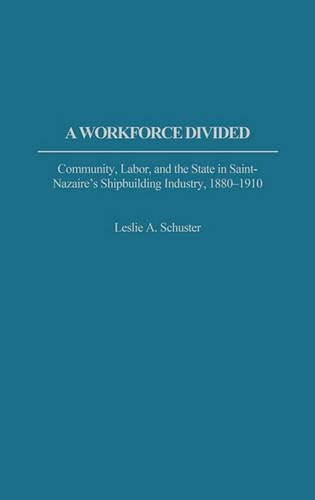
A Workforce Divided: Community, Labor, and the State in Saint-Nazaire's Shipbuilding Industry, 1880-1910
(Hardback)
Publishing Details
A Workforce Divided: Community, Labor, and the State in Saint-Nazaire's Shipbuilding Industry, 1880-1910
By (Author) Leslie A. Schuster
Bloomsbury Publishing PLC
Praeger Publishers Inc
30th December 2002
United States
Classifications
Tertiary Education
Non Fiction
Manufacturing industries
Sociology: work and labour
European history
338.47623820944
Physical Properties
Hardback
248
Description
In this study of the life and work of Faint-Nazaire's shipbuilding workers in the 30 years before World War I, Schuster shows that the consequences of industrial production for workers differed sharply according their their resources and experiences. She details the competing identities and divergent values maintained by shipbuilding workers, demonstrating that they were fostered by the interaction between state programs, industrial production, and the traditions pursued in the local realm. Third Republic economic policies for shipbuilding promoted unemployment and worker dependence on state officials over union leaders, and the uneven application of capitalist methods of production meant multiple workplace experiences that
Reviews
"Endorsement From Peter N. Stearns Provost and Professor of History, George Mason University: This is a significant addition to the rich tradition of local studies on the French working class...a well-crafted social history approach, with important implications about the nature of industrial change. Endorsement From Professor Donald Reid History Dept University of North Carolina at Chapel Hill: In this well-researched monograph, Leslie Schuster takes labor history in a new direction by convincingly challenging canonical assumptions about skill, militancy, and politics among industrial workers. Endorsement From Herrick Chapman Institute of French Studies New York University: In this deeply researched study of the French workers who built ships in Saint-Naizares before World War I, Leslie Schuster challenges received wisdom about the history of working-class solidarity and politics. Endorsement From Judith F. Stone Professor of History Western Michigan University: Schuster has an excellent command of the multiple forces shaping working class experience: Republican state policies, uneven industrial development, organization of production, work cultures and local communities. She provides significant insights about the interconnections of state policies, industrial development, and twentieth century capitalism. Peasants and Workers requires readers to reexamine earlier assumptions and as such will be essential reading for those interested in French and labor history.
Author Bio
LESLIE A. SCHUSTER is Associate Professor of History at Rhode Island College.
